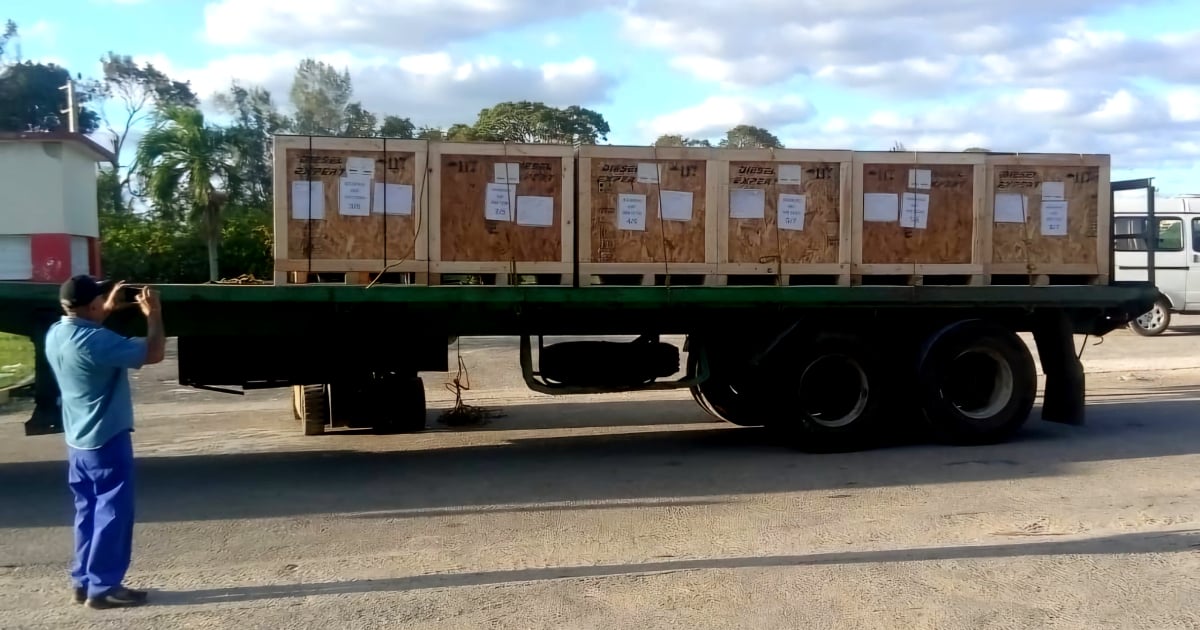
The Cuban regime announced the arrival of replacement parts for the generators purchased during the lifetime of dictator Fidel Castro to continue what the vain commander called the "energy revolution."
The Minister of Energy and Mines, Vicente de la O Levy, was responsible for delivering the "hopeful" news to the victims of his severely inadequate management, without specifying the origin of the shipment or explaining how it was possible for Cuba to receive parts and equipment that the regime allegedly cannot acquire due to the "blockade."
"The arrival of spare parts has begun for the restoration of distributed generation units, as part of the program to reestablish the generation capacities of the Electric System," the head of MINEM stated on his social media this Tuesday.
His tweet suggests that the government of Miguel Díaz-Canel is pursuing another of its "strategies" to restore the national electro-energy system (SEN), which in this case involves the rehabilitation of defective equipment from more than 1,400 fuel and diesel generators installed between 2005 and 2009.
This is not the first time the Cuban regime has promoted the idea of recovering the equipment that Castro intended to use to address the energy crisis caused by the interruption of hydrocarbon supplies from Russia.
The emergence of Hugo Chávez led to the "energy revolution" of the dictator, who deemed it reasonable to allow thermal power plants (mostly of Soviet technology) to deteriorate and directed investments in the energy sector towards the purchase of generators that would run on subsidized oil from Venezuela.
In November 2022, the Director of Distributed Generation at the Cuban Electric Union (UNE), Arles Luna Leiva, explained to Cubadebate that the 944 diesel units deployed across the country in 154 plants, along with the 507 fuel units (distributed among 35 plants), would contribute approximately 2,606 MW to the National Electric System (if fully operational).
Data from that year indicated that in Distributed Generation there were 366 units (680 MW) out of service due to a lack of spare parts and another 150 units (282 MW) halted awaiting maintenance, resulting in a total deficit of 962 MW in the National Electric System.
Currently, the exact number of generators that are out of service or awaiting replacement parts for maintenance is unknown. The UNE reported this Tuesday that, out of the 189 distributed generation plants in the country, "48 are out of service due to fuel," resulting in a deficit of 229 MW.
The state-owned company led by Alfredo López Valdés does not provide the exact number of generators that are out of service due to malfunctions and maintenance. However, this did not prevent the head of MINEM from celebrating the arrival of spare parts without substantiating his enthusiasm with figures.
A series of actions is planned to increase the available capacity in Distributed Generation by 207 MW by the end of December 2022. Additionally, a set of measures has been outlined to continue the recovery of Distributed Generation units,” Luna Leiva explained, noting that in 2023, the available capacity for Distributed Generation should increase by 1,000 MW compared to the previous year.
The strategy and its forecasts failed or were simply another lie from the Cuban regime, which now, through Minister De la O Levy, aims to persist with the “tale of the good pipe” regarding distributed generation.
With the news of the arrival of spare parts shared on their social media, many Cubans are asking the minister why this was not done earlier, as promised and planned, and why they should believe his words now.
Of the just over 6,000 megawatts of installed capacity for energy generation, the country should restore its entire distributed generation system to achieve 21.7% generation supported by fuel oil engines and 21.9% with diesel engines.
Beyond the investment it entails, which the regime is careful not to disclose, many experts criticize the strategy for the high financial and environmental costs it involves.
Aware of this, the regime is working to promote its new strategy for transitioning to renewable energy sources, promising everything from one minute of clean energy for next year to the installation of 2,000 MW of solar power by 2026.
However, Vicente de la O Levy announced that, bypassing the “blockade,” replacement parts for generators arrived in Cuba, highlighting the regime's urgency and its investor preference for short-term solutions rather than undertaking the necessary reforms and investments to restore the National Electric System, modify the country's energy matrix, and bring stability back to UNE customers, who have faced disappointments ever since Castro’s "energy revolution."
Where do the spare parts for the generators come from?
The image shared in De la O Levy's tweet shows large boxes with the label Diesel Expert displayed on them.
A quick internet search reveals that Diesel Expert is a subsidiary of Groupe Chalifour, a family-owned company with over 50 years of experience in the energy industry, headquartered in Quebec, Canada, with a presence in Paris.
Diesel Expert specializes in providing high-quality solutions for thermal power plant operators and propulsion engines. Their services include supplying certified spare parts for centrifuges from brands such as Alfa Laval, Mitsubishi, and Westfalia, as well as OEM components for medium and large-capacity diesel engines.
Additionally, they provide the renewal of cylinder heads, valve bodies, piston crowns, and cylinder sleeves. Their mission is to offer quality services and products that support their clients' operations, positioning themselves as a trusted partner in the maintenance of engines and auxiliary equipment.
And here comes the recurring question that Cubans ask in these cases: "What about the blockade?"
Filed under: